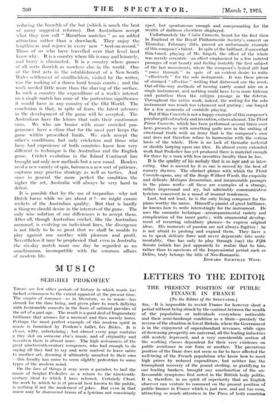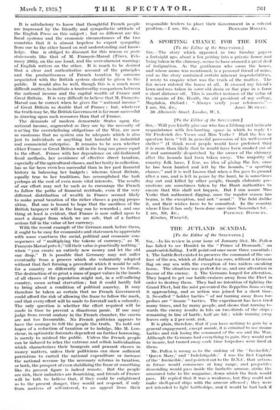LETTERS TO THE EDITOR
THE PRESENT POSITION OF PUBLIC FINANCE IN FRANCE
[To the Editor of the SPECTATOR.] SIR,—It is impossible to revisit France for however short a period without being struck by the contrast between the wealth of the' population or individuals everywhere noticeable and their semi-bankrupt condition as a State—precisely the reverse of the situation in Great Britain, where the Government is in the enjoyment of superabundant revenues, while signs of decreasing prosperity are universal, all the leading industries still acutely depressed, and a very considerable section of the working classes dependent for their very existence on public assistance in one form or another. The precarious position of the franc does not seem so far to have affected the well-being of the French population who know how to meet high prices by reduced expenditure, but neither has the triumphant recovery of the pound sterling, so gratifying to our leading bankers, brought any amelioration of the un- favourable symptoms first noted in the British body politic. It is, therefore, in no spirit of superiority that an English observer can venture to comment on the present position of public finance in France which is just now, and not too soon, attracting so much attention in the Press of both countries It is satisfactory to know that thoughtful French people are impressed' by the friendly and sympathetic attitude of the English Press on this subject ; but so different are the fiscal systems and the economic circumstances of the two countries that it is almost hopeless to expect sympathy from one to the other based on real understanding and know- ledge. One is obliged to discount for this reason ex parte statements like that of M. Francois-Marsal (Times, Feb- ruary 20th), on the one hand, and the over-alarmist warning; of English writers on the other. It is much to be desired that a clear and authoritative account of the principles and the productiveness of French taxation by someone acquainted with the British system should be given to the public. It would also be well, though this is a much more 'difficult matter, to institute a trustworthy comparison between the national income and the capital wealth of France and Great Britain. It is very difficult to believe that M. Francois- Marsal can be correct when he gives the " national income " of Great Britain as double that of France ; but, whatever the truth may be, the British Government is far more successful in drawing upon such resources than that of France.
The demands of modern democratic States upon the national income, augmented as they are by the necessity of meeting the overwhelming obligations of the War, are now so enormous that no system can be adequate which is also just to individuals or anything but harmful to industrial and commercial enterprise. It remains to be seen whether either France or Great Britain will in the long run. prove equal to the effort. France with her dependence on old-fashioned fiscal methods, her avoidance of effective direct taxation, especially of the agricultural classes, and her laxity in collection, has so far been even less successful than in her past financial 'history in balancing her budgets ; whereas Great Britain, equally true to her traditions, has accomplished the task perhaps at the cost of even more vital interests. The results of our effort may not be such as to encourage the French to follow the paths of financial rectitude, even if the very different distribution of wealth in France seemed likely to make penal taxation of the richer classes a paying propo- sition. But one is bound to hope that the sacrifices of the British taxpayer will in the long run be rewarded ; and one thing at least is evident, that France is now called upon to meet a danger from which we are safe, that of a further serious fall in the value of her currency.
With the recent example of the German mark before them, it ought to be easy for economists and statesmen to appreciate with some exactness the social, political and economic con- sequences of " multiplying the tokens of currency," as M. Francois-Marsal puts it," till their value is practically nothing." when " you create' an entirely new money and let the old one drop." It is possible that Germany may not suffer eventually from a process which she voluntarily adopted without that fact forming a precedent which it would be safe for a country so differently situated as France to follow. The destruction of so great a mass of paper values in the hands of all classes of the population might not, in a self-sufficing country, mean actual starvation ; but it could hardly fail to bring about a condition of political anarchy. It may therefore be taken as certain that no French Government could afford the risk of allowing the franc to follow the mark, and that every effort will be made to forestall such a calamity. The only question is whether the effort required will be .made in time to prevent a disastrous panic. If one may judge from recent oratory in the French chamber, the omens are not too favourable. No French politician appears to have the courage to tell the people the truth. To hold out hopes of a reduction of taxation or to indulge, like M. Lou- cheur, in optimistic forecasts dependent on further borrowing, is merely to mislead the public. Unless the French people can be induced to relax the extreme and selfish individualism which characterizes their bourgeois and peasant classes in money matters, unless their politicians can show sufficient patriotism to curtail the national expenditure or increase the national revenue by the necessary reforms in taxation, or both, the prospect of even stabilizing the franc at something like its present figure is indeed remote. But the people are rich, their industries are flourishing, and friends of France will be loth to believe that, if they could be enlightened as to the present danger, they would not respond, if only from motives of self-interest, to an appeal from their responsible leaders to place their Government in a solvent



























































 Previous page
Previous page